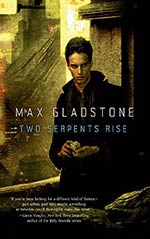
![]() Nymeria
Nymeria
1/24/2017
![]()
A few years ago I read, and greatly enjoyed, Max Gladstone's THREE PARTS DEAD, a totally new take on fantasy and magic, and afterwards I kept reminding myself to read more of this series--especially when I learned about the new books being published--but such are the fluctuating "currents" of my TBR pile that this second volume was being constantly shifted back. Now that I've finally read it, I'm struggling with a creeping feeling of disappointment, as if something that I had greatly appreciated in the first book was sadly missing here.
The story does not take place in Alt Coulumb, like book 1, but rather in Dresediel Lex, a city whose past seems to hint at an Atzec-like culture, made of stone pyramids, winged serpents and human sacrifices to the gods. The latter have been taken out of the equation after an equally bloody war in which the gods were vanquished and supplanted by deathless kings and a form of magic that uses soul as currency, although many still worship the decades-gone gods and look with longing at the times when blood was freely spent to garner the favor of those divinities.
Despite this more secular imprint on society, life in Dresediel Lex can be hard: the place sits in a dry, desert-like area (it could somehow remind me of Las Vegas, if it weren't for its proximity to the sea) and water supply is the main problem the inhabitants have to face, since the ever-growing population's needs have already run dry the nearest sources. Caleb Altemoc is a senior risk manager at Red King Consolidated, the corporation that actually runs the city and delivers its water through a complicated net of pipes and Craft, a combination of technology and magic that uses some of the now-subjugated gods as power sources.
When the water from the current reservoir becomes poisoned by Tzimet--fanged, demon-like creatures that can come out of the faucets and attack the citizens--Caleb is called to investigate and his suspicions are equally divided between his father Temoc, one of the last priests supporting the old religion, forced to live in hiding, and Mal, a mysterious woman Caleb saw running over the structure of the reservoir. Mal is also tied to Heartstone, a firm that RKC is going to acquire to expand its power base and its reach in the services offered to the city, and so Caleb's attraction to her becomes mixed with the investigation and the number of unanswered questions circling around Mal.
The investigation brings Caleb into a maze of ancient secrets, long-held grudges and the ever-growing threat of seeing everything that RKC and the King in Red did, to unshackle the citizens from the need to appease the gods with human sacrifice, turn to ashes: the fact that the path RKC has taken is crumbling under the law of diminishing returns gives the loyalist of the "old regime" the lever they need to try and bring it all back to reinstate the old ways. There is much to keep one's attention in this story, not least the increasing sense of impending doom that comes from Caleb's discoveries, that in turn climax into a scene of city-wide mayhem in which the titular Serpents play a focal role.
The main question is a complex one, whether it is preferable to stick to the old ways--ensuring the prolonged survival of the city through human sacrifice--or embrace the new ones, which however do not guarantee the same kind of continuity. Someone would be made to suffer either way, and the only choice allowed is to pick the victim: a sacrifice on the altar to buy the gods' favor, or a war with other cities for their resources once the ones at hand are depleted. As the author writes at some point:
"You seem to think it's different if we kill for gods or for water; either way the victim dies at the end."
Despite the fascinating conundrum, the sense of incompleteness I was mentioning before did linger all throughout the book, and in the end I believe it was because Caleb feels a bit thin--especially if compared to other, more interesting and fleshed-out figures, like Caleb's friend Teo, with her sharp, world-wise attitude and staunch attachment to the people she cares about; or his father Temoc, whose love for his son cannot be separated from the loyalty he feel for his gods and the tenets of his faith. Caleb is indeed the child of two worlds, the old and the new, and he dwells in a no-man's-land of uncertainty that, sadly, spreads into the area of character development: besides the obsession for the elusive Mal and his gambling, there is not much to make him stand out, and at the end of the story he's not much different from the man he was at the beginning--at least from my point of view.
I did ultimately enjoy the book, but not as much as I'd hoped after the great experience that was Three Parts Dead: the perceived weakness of the main character, and the less intriguing background (I found Alt Coulumb much more fascinating a place than Dresediel Lex) were something of a letdown. Still, I'm curious about the world of the Craft Sequence, and will certainly read other books in this series, in the hope of finding again the... magic of the first volume.
http://spaceandsorcery.wordpress.com